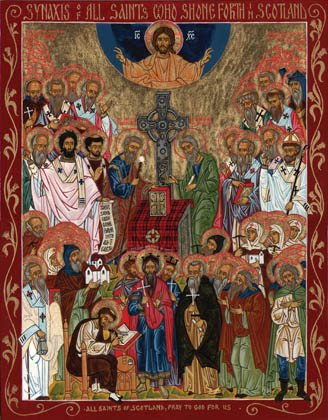by Fr. Gregory Hallam

St. Hilda of Whitby (icon by Aidan Hart)
The recovery of the Saxon, that is, broadly speaking, the Old English Church in the minds of the contemporary English is a vital task. In so far as the English once found their place within a religious and social pluralism that included the Celts then perhaps we should be optimistic about the recovery of an English identity within contemporary Britain. No one bats an eye at the Scots, Irish or Welsh recovering their identities. This is much praised but not so, unfortunately, with England. Maybe this is because England is associated in the minds of the politically correct with the oppressor. If there is an oppressor to be reckoned with here it is surely William the Conqueror who put an end to the golden age of English culture. So complete is the propaganda associated with the Conquest that no one really thinks that anything worthwhile existed before William breathed fire through the land nearly 1000 years ago. The Normans brought the Dark Ages and then induced everyone to believe that their reign was "light" in comparison with the so-called "Dark Ages" that had gone before.
It is difficult to define the English Church since "England" really consisted of many different kingdoms, races and peoples. Many understand the word "English" to be coterminous with the Anglo-Saxon culture and this is fair to a point. So how did these Germanic and Danish peoples, the Angles, the Saxons, the Jutes and others become Christians?
Well, we should not rob St. Augustine of Canterbury of his fare share of this work. Here was an Orthodox Christian bishop who with a small band of 40 monks stayed 7 years at the turn of the 7th Century and converted King Ethelbert and His Kingdom in Kent to the Faith of the Apostles. The names of Augustine, Pope Gregory the Great who sent him, and the Apostles Peter and Paul were ever to be revered by the English but no less so than the Celtic missionaries who had evangelised the North of England and lowland Scotland (as is now) from the West. The English Church had such a profusion of saints in the 400 years before the Schism that it’s difficult now to adjust our expectations of England today to this high water mark.
Orthodoxy is not, however, concerned to recover some sort of lost racial consciousness, a place "forever England." That would be to violate the vision of our forefathers whom God used as architects of the Kingdom of God, a nation that knows no boundaries. Pre-eminent among these "English" fathers for example is St. Theodore of Tarsus, Archbishop of Canterbury, (668-690), a Greek pastor who lovingly welded the Celtic and Anglo Saxon Orthodoxy of many scattered kingdoms into a truly united Church for all races under Christ. His was a true Orthodox pluralism not based on English national identity, (for such a thing did not exist), but on the commonwealth of Heaven. England, like Zion, is not a nation, she is an attitude of mind, a presence in the heart, a rustle of wind amongst the people, the trace of the Holy Spirit. When the Normans came under a new and confusing papal banner and laid waste to England’s innocence at Hastings and thereafter, they did not destroy England, but they did subvert its national life, replacing the flowers of Eden with the thorns of efficiency and grandeur. Much of that legacy endures today in the British establishment.
For a while, perhaps, we have been seduced by the pompous grandeur of a "greater" Britain. The Scots, the Irish and the Welsh won’t put up with it anymore. Isn’t it about time that the English didn’t either? But, we should be aware. We must not play the Norman mentality at its own game. Orthodox England will not be rebuilt by her politicians, but, as ever before, by her saints. We by the mercy of God, have been called to play our part in this recovery of the heart of England which is Christ and the land which, according to our tradition, is Mary’s dowry. Let us be worthy of such a high calling. Sometime, perhaps in the far distant future, or perhaps next year, Orthodox England will live again. God knows. For us it is sufficient to sing and to work; to love and to pray. May Christ our God have mercy on our souls, Amen!

No comments:
Post a Comment